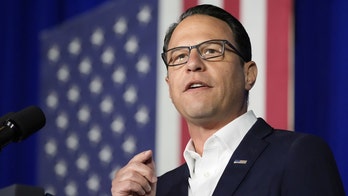The numbers are indisputable: 103 federal court vacancies, 38 of them classified by the Administrative Office of U.S. Courts as "judicial emergencies." A growing chorus of court watchers says it's time to get serious about the problem and start demanding solutions.
Even Supreme Court Justice Anthony Kennedy has weighed in saying, "the excellence of the federal judiciary is at risk." For every empty seat on the bench there are judges working to juggle massive caseloads and average Americans waiting for their legal disputes to be resolved.
Now - the blame game. Many point to the White House, and the fact that there are only 41 nominees in the pipeline. Nominees come only from the president, and critics say he needs to ramp up the pace.
Carrie Severino, of the Judicial Crisis Network, says Obama lags far behind the number of nominations that former Presidents Bush and Clinton had submitted by this same time in their first terms.
"He has a great team that should be able to identity qualified candidates," Severino says, adding, "[the delay] is strange for someone who's a constitutional scholar, but he has legislative priorities instead."
Others lay the blame squarely at the feet of Republican senators, primarily Minority Leader Mitch McConnell.
"In some cases he's demanded hours [of debate] on nominees that are then voted on 99 to nothing on the Senate floor," argues Doug Kendall, president of the Constitutional Accountability Center.
Kendall says GOP senators are using a number of delay tactics, including secret holds. Those holds are tough to pin down because no member has to publicly disclose they've placed one, so no one truly knows how many may, or may not, be in place right now.
McConnell spokesman Don Stewart points the finger back at Democrats, who currently control the U.S. Senate, and says senators cannot confirm nominees that don't exist.
One of the nominees who did not make it through the Senate gauntlet this year is law professor Goodwin Liu. President Obama nominated him to take a seat on the Ninth Circuit Court of Appeals, but conservatives expressed a number of concerns about Liu's judicial philosophy and view of the U.S. Constitution. Liu was bounced back to the White House without ever getting a vote before the full Senate, but the President has decided to double down. On Monday, he sent Liu's nomination back to the Senate, likely setting up another contentious showdown.




